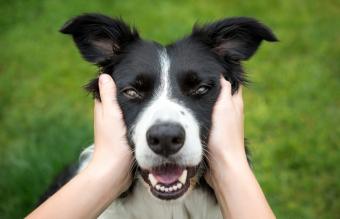
Choosing your first dog is an incredibly exciting experience. You've probably scrolled through a ton of breeds, wondering which one would suit you the best. And as a dog behaviorist, I get asked which dog breeds are best for first-time owners a lot.
Every dog is different, and even though they're all adorable, it's important to pick one that fits your lifestyle and home environment. Knowing the facts about different dog breeds, even when choosing a mixed breed, can help you understand your prospective dog's needs and what will make them the happiest, then compare that to how you live your life. That said, there are some breeds that have a special mix of trainability, laid-back demeanors, and more that suit a lot of homes. Check out my top 10 breeds for beginners, then find out what else creates a match made in dog/human heaven.
The Happy Bichon Frise

The bichon frise, is perfect for first-time pet parents looking for a small dog who is good with children and doesn’t require a ton of exercise. They’re relatively easy to train and adapt well to nearly every lifestyle.
The most difficult part of taking care of them is making sure their coat stays healthy. Bichons don't shed and are low-allergen — a bonus for allergy sufferers — but this means that a monthly trip to the groomers will be necessary for first-time owners to clip and brush these pups' luscious locks.
RELATED: 30+ Hypoallergenic Dog Breeds
The Mellow Greyhound

While greyhounds love to run, they're actually the epitome of couch-potato dogs. Give these dogs a fenced area to run 30 minutes a day, and they'll be happy spending the rest of it curled next to you Netflix and chillin'. They don't bark often and are generally referred to as "velcro" dogs, preferring to lean in and stay with their owners as much as possible. Their gentle demeanor, eagerness to please, and deep attachment to their people make these great first-time dogs.
It's important to note that greyhounds can have a high prey drive, and they're sight hounds, so they probably won't ever be able to be the beach dog running off-leash. (When these dogs see something to chase, they gooooo.) This can also mean that a house with cats or other small animals should select a greyhound who has already lived with these animals or skip the breed for beginners.
Greyhound lovers often refer to their dogs as "chipping" dogs because once you get a greyhound, "you can't just have one."
The Hypoallergenic Poodle

Poodles make awesome companions, and there are three sizes of them to choose from: toy (5–9 pounds), miniature (15–18 pounds), or standard (45–70 pounds). This means you can choose a tiny, small, or medium-sized dog breed here. Plus, if you’re someone who experiences allergies when there’s too much fur swirling around, you can take a breath of relief — these guys are known to be hypoallergenic.
You’ll need to pay attention to their fur — grooming them regularly and visiting the groomer if they have any tangles. You may not be able to get them out yourself. They can also be stubborn from time to time, but for real, who isn’t?
Poodles are super adaptable to any environment and usually do very well with kids.
The Loving Shih Tzu

The shih tzu is a small dog jam packed with love and affection. As long as they’re sitting next to you, or at least near you, they could care less about what else is going on in the world around them.
They are super loving to their people, including the kids in the house. And, unlike many other dog breeds, they aren’t prone to excessive barking, which can be a huge plus for anyone in an apartment (or just someone who doesn’t want to listen to barking all the time).
Shi tzus will require regular grooming for first-time dog owners. Make sure to plan a regular trip to the salon in your budget and talk to your groomer about the types of puppy cuts that are easiest to maintain so your pup doesn't get matted.
The Hearty Havanese

Havanese are a sweet and hearty breed that does well in many families and is eager to be with their people. They're smart and, like the Bichon, can be very clown-like, entertaining their families with their silly and puppy-like natures. Like the Bichon, they can also be challenging to groom, so a regular trip to the groomers is going to be a must for any first-time dog family looking at this breed. They can also be a tad prone to separation anxiety, so plan to work with a trainer from a young age to make sure your havanese is confident and social as an adult.
The Quintissential Golden Retriever

I don’t know about you, but when I think of the ‘traditional’ dog, I often picture a golden retriever in my head. They’re widely believed to be the ideal family dog, suitable for every home and family.
They’re great with children, loyal, affectionate, and ready to do anything as long as they’re by your side, but do have higher energy requirements than most the breeds covered so far. If you plan to get a younger golden, make sure you have time and the ability to get them outdoors regularly for hikes, runs, and more. Their popularity can also be their downfall, as golden retreivers have been overbred to the point of having cancer more much frequently than other dog breeds. Like other breeds, they do need to be brushed regularly to distribute oils through their fur and prevent matting.
Approximately 60% of golden retrievers will develop cancer in their lifetimes versus 25% of other dog breeds.
The Silly Cavalier King Charles Spaniel

The cavalier King Charles spaniel is a serious jokester. They enjoy showing off their cute side and are known to be good with people of all ages, ranging from babies to the elderly.
They’re easy to train and will love on literally everyone, including the random strangers along your daily walks. While they do require some exercise, it’s nothing extensive — 30 minutes or so would be just fine. Like many other dogs, a daily brushing and regular trip to the groomer is a must for these little clowns, as their thin, long hair tangles easily.
The Affectionate Labrador Retriever

Like the golden retriever, the labrador retriever is common in a lot of households throughout the United States. Their popularity is often due to their kind, affectionate nature and the close bonds they form with their humans, including the children of the family.
They’re playful, intelligent, and enjoy learning anything and everything they can, though they can be moderately high-energy dogs, especially in younger life. Their coat requires very little maintenance, generally only needing to be brushed to keep it healthy and prevent your house from developing mounds of furballs.
All this said, prospective lab owners should be aware of this dog's relationship to food. They're more likely to beg, scavenge, and otherwise be food-obsessed than other dog breeds, a new study found. Before adopting a lab, have a family chat about how to manage food-scavenging and keep temptation away from your new pup.
These guys weigh between 55-80 pounds and stand 21-24 inches tall on average.
The Adaptable English Springer Spaniel

I have an English springer spaniel and, let me tell you, he is absolutely my very best friend. Whether it’s sitting on the couch or going on a road trip 10 hours away, he’s in for the ride. English springers are eager to please with a cheerful, happy-go-lucky attitude and there’s nothing they love more than their families.
They do require some exercise, but a walk around the block or a hike through the woods is usually sufficient. And they’ll need to be brushed daily and trimmed as needed. Keep in mind that their fur tends to grow faster than you’d expect.
Ice, water, and mud can get stuck in between their paw pads if their feet don’t stay trimmed.
Sign up for our newsletter featuring all the latest stories and products we love.
The Well-Rounded Papillon

The papillon, a charming small breed, is remarkably adaptable and thrives in various living environments. Whether they're residing in the spaciousness of the countryside or in a cozy city apartment, these dogs adjust well and make the most of their surroundings. This flexibility is one of the breed's endearing traits, allowing them to fit comfortably into different lifestyles.
Despite their small size, papillons are energetic and require daily playtime to stay happy and healthy. They have a playful and curious nature, which makes them eager participants in both indoor and outdoor activities. This breed's adaptability and ease of entertainment make them a wonderful companion for various owners, whether they're active individuals or those who prefer a more relaxed lifestyle.
What Should First-Time Dog Owners Look for In a Breed?

Ease of training definitely helps the beginner dog owner, but that's not all that goes into choosing a first-time dog breed. While you're scrolling through the lists of 'easy' dog breeds, it's also important to consider: are they easy for the beginning pet parent? Or, are they easy for those already experienced with dogs?
Here's what makes a breed good for beginners:
Grooming Level
Those who are new to the dog world may become overwhelmed quickly with a dog that requires a trip to the groomer on a constant basis. Consider what your limits are, and budget. If going to the groomer monthly isn't for you, consider a short-haired breed that doesn't shed much, like the greyhound.
Energy Level
High-energy dog breeds can be tough for first-time dog owners who don't know what to expect. Make sure to match your lifestyle to your dog's energy requirements to keep you both happiest.
Social Abilities
Good beginner breeds aren't afraid to be social with strangers and tend to be incredibly affectionate. That said, remember that all dogs will need help socializing from a young age. If you're unsure how, consider adopting an older dog who's already socialized or working closely with a trainer.
Stubborn Streak
Unless you're prepared for a serious challenge, look for dog breeds without an extreme stubborn streak. These can be amazing dogs, but also serious challenges for first-time dog owners.
Prey Drive
Dogs with high prey drive will quickly turn their minds to 'SQUIRREL' even during training. Look for a dog with a relatively low prey drive if you're a beginner, or resign yourself to keeping your dog on-leash or in a fenced yard at all times.
Becoming a First-Time Dog Owner

Congratulations! You're embarking (pun intended) on an amazing journey as a new dog parent. Just keep in mind, you're not alone. Your veterinarian, groomer, walker, sitter, and other neighborhood pet professionals are all available to help you. Don't be shy — reach out early and often to avoid issues and keep both you and your pup on the path to success.







